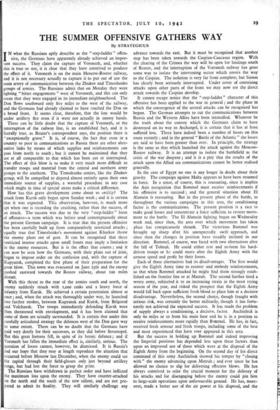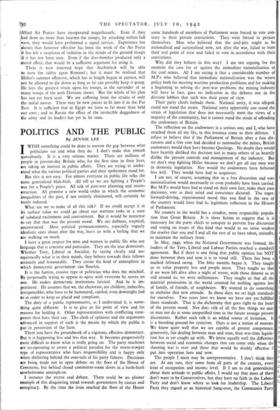THE SUMMER OFFENSIVE GATHERS WAY
By STRATEGICUS There can be little doubt that the capture of Voronezh, or the interruption of the railway line, is an established fact, and it is literally true, as Reuter's correspondent says, the position there is "exceptionally grave." It is, of course, the fact that even in a country so poor in communications as Russia there are other alter- native links by means of which supplies and reinforcements can pass from north to south ; but it cannot be maintained that they are at all comparable to that which has been cut or interrupted. The effect of this blow is to make it very much more difficult to transfer troops and material from the central and northern army groups to the southern. The Timoshenko armies, like the Zhukov group, will be compelled to depend almost entirely upon their own immediate source of supplies, a wasteful procedure in any case which might in time of special stress make a critical difference.
How has this grave development come about so swiftly? The attack from Kursk only began upon Sunday week ; and it is certain that it was expected. This observation, however, is much more apt when one is recording the crushing, rather than the success, of an attack. The success was due to the very " step-ladder " form of offensive—a term which was before used contemptuously about the present German campaign. It is true that the present offensive has been carefully built up from comparatively restricted attacks ; equally true that Timoshenko's movement against Kharkov threw the enemy plans out of gear. It can be recognised that these restricted intense attacks upon small fronts may imply a limitation in the enemy resources. But it is the effect that counts ; and it can now be seen how the Germans, with their plans out of joint, began to impose order on the confusion and, with the capture of Kupyansk, completed the first phase of their preparation for the great blow. This town was evacuated on June 25th and the enemy pushed eastward towards the Rostov railway, about too miles distant.
With this threat to the rear of the armies south and north, the enemy suddenly struck with i,000 tanks and a heavy force of infantry from Kursk. He achieved a certain penetration almost at once ; and, when the attack was thoroughly under way, he launched two further strokes, between Kupyansk and Kursk, from Belgorod and Volchansk. The troops immediately defending Kursk were then threatened with envelopment, and it has been claimed that some of them are actually surrounded. It is certain that under this carefully articulated strategy the defences west of the Don gave way to some extent. There can be no doubt that the Germans have paid very dearly for their successes, as they did before Sevastopol. But this great fortress fell, in spite of its heroic defence; and if Voronezh has fallen the immediate effect is, similarly, serious. The question of tosses cannot, however, be dismissed. It is Russia's and our hope that they may at length reproduce the situation that occurred before Moscow last December, when the enemy could see the capital through their field-glasses only just beyond artillery range, but had lost the force to grasp the prize.
The Russians have withdrawn in perfect order and have inflicted the maximum loss upon the enemy. They have counter-attacked on the north and the south of the new salient, and are not pre- pared to admit its finality. They will similarly challenge any
advance towards the east. But it must be recognised that another step has been taken towards the Caspian-Caucasus region. With the clearing of the Crimea the way will be open for landings south of Rostov, and the interruption of the Voronezh railway has gone some way to isolate the intervening sector which covers the way to the Caspian. The isolation is very far from complete; but liaison has clearly been seriously interrupted. Under cover of containing attacks upon other parts of the front we may now see the direct attack towards the Caspian develop.
-It cannot escape notice that the " step-ladder" character of this offensive has been applied to the war in general ; and the phase In which the convergence of the several attacks can be recognised has begun. The German attempts to cut the communications between Russia and the Western Allies have been intensified. Whatever be the truth about the convoy which the Germans claim to have destroyed on its way to Archangel, it is certain that it has at least suffered loss. There have indeed been a number of losses on this route recently ; and in the general " Battle of the Atlantic " the losses are said to have been greater than ever. In principle, the strategy is the same as that which launched the attack against the Moscow- Rostov railway. It is an attempt to isolate the battlefield as the crisis of the war deepens ; and it is a pity that the results of the attack upon the Allied sea communications cannot be better realised generally.
In the case of Egypt no one is any longer in doubt about their gravity. The campaign against Malta appears to have been resumed in force. In a sense, of course, this is reassuring, since it implies the Axis recognition that Rommel must receive reinforcements if his offensive is to succeed ; and the general situation about El Alamein is reassuring. But in the present phase of the battle, as throughout the various campaigns in this area, the conditioning factor is the communications. The present position is a race to make good losses and concentrate a force sufficient to restore move- ment to the battle. The El Alamein fighting began on Wednesday week and, since then, the area over which movement has taken place has conspicuously shrunk. The victorious Rommel was brought up sharp after his unexpectedly swift approach, and since then the changes in position have steadily inclined in our direction. Rommel, of course, was faced with two alternatives after the fall of Tobruk. He could either rest and re-form his hard- driven troops or he could move after the Eighth Army with the utmost speed and profit by their losses.
Each of these alternatives had its disadvantages. The first would give the Eighth Army time to recover and embody reinforcements, so that when Rommel attacked he might find them strongly estab- lished on the frontier line or at Matruh. The second further tired a weary army, subjected it to an increasing strain in the most trying season of the year, and risked the prospect that the Eighth Army would fall back upon sufficient fresh blood to place him at a decisive disadvantage. Nevertheless, the second choice, though fraught with serious risk, was certainly the better militarily, though it has fortu- nately not achieved the expected success. It has made the problem of supply always a conditioning, a decisive, factor. Auchinleck is only 6o miles or so from his main base and he is in a position to receive reinforcements more rapidly than Rommel. He has, in fact, received fresh armour and fresh troops, including some of the best and most experienced that have ever appeared in this area.
But the success in holding up Rommel and indeed improving the Imperial positions has depended less upon these factors than upon an improved use of those which were at the disposal of the Eighth Army from the beginning. On the second day of his direct command of this army Auchinleck showed his temper by "closing with" the enemy advancing upon Matruh ; and ever since he has allowed no chance to slip for delivering effective blows. He has always contrived to seize the crucial moment for the delivery of his attacks and for disengaging before the enemy could pin him to large-scale operations upon unfavourable ground. He has, more- over, made a better use of the air power at his disposal, and the 'Allied Air Forces have co-operated magnificently. Even if they had done no more than hearten the troops, by attacking within full view, they would have performed a signal service. Experience has shown that however effective has been the work of the Air Force it has left a suspicion of isolation in the minds of the ground troops if it has not been seen. Even if the dive-bomber produced only a moral effect, that would be a sufficient argument for using it.
There is now renewed hope that Auchinleck will be able 1 to turn the tables upon Rommel ; but it must be realised that 'Hitler's summer offensive, which has at length begun in earnest, will not be allowed to die down as long as he can possibly keep it going. He lays the greatest strain upon his troops, as the surrender of so many troops of the 90th Division shows. But the whole of his plan has not yet been seen. We are suffering from the strains of only the initial moves. There may be new pieces to fit into it in the Far East. It is sufficient that in Egypt we have so far more than held our own ; and in Russia the effect of the invincible doggedness of the army and its leaders has yet to be seen.



























 Previous page
Previous page